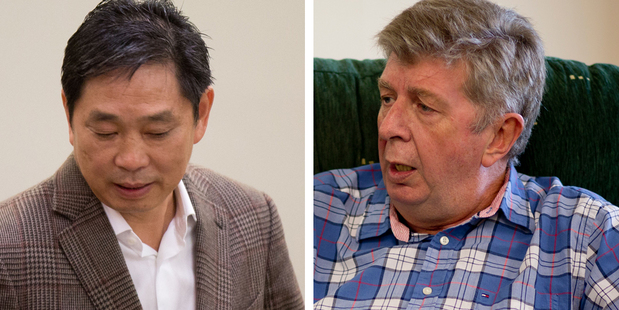
The problem for National and the latest Maurice scandal is that it all starts looking like one large, infected and corrupt pus pit.
The latest revelations that Maurice helped do some work on Donghua Liu’s bach on top of the donations and weird questioning of the police in a domestic violence case look less and less defendable.
That’s an issue because it now starts looking like a pattern.
Maurice follows the resignation of Richard Worth, Pansy Wong, Phil Heatley and Nick Smith. That’s not a tragic loss of MPs in 6 years, but it occurs at the same time National’s ongoing relationship with big corporates is very much in the spotlight.
National’s role with Chorus, Sky City, Rio Tinto, Warner Bros, Wanganui Collegiate and most recently Oravida create a terrible perception that National isn’t really governing for everyone, they are governing for a few elites.
With so much swirling around donations to political parties, isn’t it time to consider publicly funding our political parties? If we want to remove the influence of big money from politics, remove the need for politicians to have to flirt for those donations in the first place.
Law God Andrew Geddis put forward the argument for publicly funded election campaigns for Political Parties in his 2007 public policy essay…
The third set of responses can be termed public assistance measures. They complement the egalitarian objective of the previous two forms of regulation by replacing the role that private (and thus unequally distributed) sources of wealth can play in the electoral process with a ‘clean’ source of funding – the general taxpayer. Further, such measures may be designed to provide funding to parties or candidates which otherwise would struggle to raise private funds, thereby enabling a greater range of voices to participate at the election. A variety of different forms of public assistance measures are available: direct payments to electoral participants on a ‘dollar-per-votes’ basis; post-election refunds of the expenses incurred in campaigning; matching donations for small, individual donations; tax credits to compensate small donors for their gift; the provision of broadcasting time or other campaign benefits to qualifying contestants.
…publicly funding political party election campaigns would remove all money influence from the political decision making process.
Currently the rules for election spending is as follows…
During the three-month regulated campaign period each registered political party is limited to spending a total of $1 million. This is regardless of the size of the party. Plus, each party can spend an additional $20,000 incl GST for each individual constituency seat it contests.
An individual candidate is limited to spending $20,000, incl GST.
…so based on the current 8 parties in Parliament spending a million each plus the full $20 000 per electorate they can spend, for a total of $20million from the taxpayer, we remove big money from the political process.
If we want our democratic process to be removed from the kind of grubby relationships that Oravida and this Maurice Williamson fiasco has exposed, then removing the need for political parties to have to go and raise this type of funding ends that influence.
It’s time to seriously discuss publicly funding election campaigns.






That’s “Donghua Liu’s bach”. Not a biggie, but my first reaction was “batch of what?”
Methinks Maurice has caved in too quickly. Am sure there is another story behind this story…….Would be nice to have public funding but if wealthy people wish to live here it seems they must give-in to this blackmail scheme. I bet K.com now rues his ‘donations’ having gotten not so much as a mattress in his cell when had he bought a bach next door to a minister, who knows what help he could have had?
My favoured model of funding is a complete ban on all donations with political parties funded solely by capped membership fees topped up by the state using a set formula. So let’s say that for every financial member you get a $25-35 top up. A party with 10,000 members would get an annual grant of $250-350,000 of taxpayers money. there would be an upper limit PA of around $600-750,000. I like this model for two reasons:
1/ I am strongly of the view that democracy thrives on participation at the grass roots. Funding based on membership means attracting and retaining party members will matter – parties will have to work to create broad-based memberships to qualify for cash. it would probably mean the end to astro-turf parties like ACT and vanity projects like CCCP.
2/ Because members count such a funding model acts as a powerful handbrake on the palace politics of the party machinery that things like the centralised control of the party list has created that is an unwanted unintended consequence of MMP.
Individuals contesting constituency seats would have a cap on their spending of say 20k in the three months before the election, and no more than $60,000 in the three years before the election.
A good call.
1. I’d hate to see NZ end up with anything that even remotely resembles the absurd parody of democracy that they have in the USA.
2. Where private donations are permitted, it will always be the case that any party that aims to govern mainly for the top 1% of incomes will be better funded than a party that governs for “the rest of us”.
Based on current polling, there is no party governing for this fictional 1%, so I have no idea what you’re on about.
C’mon IV, can’t you come up with a better argument than that? Everyone knows what the 1% refers too.
Actually it is a fictional group of people that the left keep trying to demonise. Other than I doubt you have the slightest idea.
But in case you missed the point, the current Govt. enjoys close to 50% public support and close to 65% approval rating. That indicates that a lot more than 1% are benefitting from their policies.
Anymous User IV: “I have no idea…”.
The first thing you’ve ever said that I concur 100% with.
So you don’t know what Murray’s on about either? Gee, not something else we agree on Frank?
Donations are crony capitalism.
Kiwis say no to crony capitalism. No to Shon Key backdoor deals. Corruption has been clearly exposed by Williamson and Collins and Tolley and Smith and Jones/McCully.
Kiwis need to draw on that spirit that saw oppressed ‘cake-eaters’ leave England, Scotland, Ireland, Wales, Denmark and the Pacific Islands in their thousands for a better egalitarian life in egalitarian New Zealand, far from doffing caps and cow-towing and Tory crony capitalism and privelege.
$5,000 a head fund-raisers and $56,000 golf games with the Tory oligarchy, $22,000 donations to National by wife-beaters and nasty Tory interference with the police process. This is corruption.
New Zealand needs to say. 再见裙带资本主义
“Donations are crony capitalism.”
Even donations to Labour, Greens and Mana? How about the Unions financial support for Labour? Is that crony socialism?
Yes, Kiwi’s say no to corruption.
“The Labour Party has escaped prosecution for breaching electoral law with its pocket-sized pledge cards, despite police finding there was a prima facie case against it.
It is the third time the police have found a prima facie case against the Labour Party or a Labour MP and not pressed charges.
Last November police found a prima facie case that Cabinet Minister David Benson-Pope had assaulted students while he was a teacher, and in 2002 a prima facie case was found that Prime Minister Helen Clark committed forgery when she signed a painting someone else had created.”
http://www.nzherald.co.nz/nz/news/article.cfm?c_id=1&objectid=10373214
The problem for Key is he is relying on China as the life blood for NZ the country has been so poorly managed over the past 30-40 years we have to rely on the Chinese coming and buying up what is left of NZ.
John Key has basically got the BIG FOR SALE sign up, huge tracts of Aucklands Residential Housing is now Asian owned however we do not really know how much as the Government does not keep accurate records of who owns land in NZ.
Jack:
There is probably a reason why “Government does not keep accurate records of who owns land in NZ.” There will be some personal benefit to them ‘going on’ somewhere.
Soon we will see a few Chinese MP’s, and then not long after that we will have maybe a 2nd generation Chinaman as primeminister, and then it’s all over rover for anything kiwi in NZ.
You cannot sell out your country like Key and National are doing without it being called treasonish – especially when the public referendum vote said NO to selling our assets. Key got away with saying something like “We don’t have to take on board the results of public referendums.” And then proceeded to go against the majority NZ vote.
Where is the Governor General in all this.
Once the TPPA has been signed there will be no legal way of preventing the Chinese owning any NZ property they can afford.
My opinion and belief.
‘2nd generation Chinaman’.. seriously?
The majority of second generation ‘Chinaman’ (your word.. not mine by the way) tend to assimilate and integrate with their fellow Kiwi acquaintances and friends.. if given the chance.
It is not them (‘2nd generation Chinaman’) you should be throwing your expression of distaste at.. the right target would most probably be their parents – first-generation immigrants who are not prepared… or at the very least try to integrate to Kiwi way of life and society.
Their sons and daughters are just as much a New Zealander as you and me – they are born here, well-versed or at the very least well-adequate in the use of the English language both oral and written as well as holding our overall liberal principle and set of belief.
Beware of the historically-proven evil known as racial profiling combined with discrimination and prejudice.. nothing good will come out of it.
However, I do agree with you that the first-generation immigrants are generally the source of the problem… and unfortunately racial profiling whole ethnicity will surely not solve the problem we are having as of the present at all.
There are some worthy suggestions being made here. All merit further investigation by the Electoral Commission.
Yes to publicly funded election campaigns.
It needs to be on this years voting papers, so it’s done and dusted before the next election.
And you’re happy for Labour to lose all of it’s Union funding?
I’d be very happy for everyone to be given the same amount of funding per person. This is entirely fair.
However nothing will ever guarantee that any politician will refuse to accept a bribe.
Opinion.
The ultimate source of all private funding should be declared, no matter the amount, no matter how it is channeled, then we would have full transparency. For example we still don’t know who the two anonymous donors to David Cunliffe’s campaign were, and perhaps never will.
Another issue is Union funding of Labour, which is little more than crony socialism, considering that some union members will not be Labour Party supporters, and the level of corruption that exists within the wider union movement.
[…] I pointed out last week, publicly funding political party election campaigns would remove all money influence from the […]
Comments are closed.